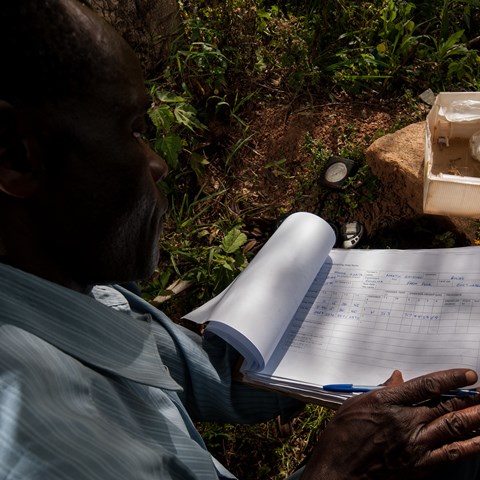Contact

Johanna Wetterlind, Assoc. Professor
Challenge leader of AgriFoSe2030 Challenge 3
Department of Soil and Environment, SLU
Telephone: +46 (0) 511-671 12
E-mail: johanna.wetterlind@slu.se

By arbitrary applying conventional pesticides on crops and wearing poor or no protective equipment when using these chemicals have large impacts on human health and the environment. This is why there is a need for safer alternatives. This project on agricultural biologicals falls under Challenge 3 Science-based innovation and extension.
The arrival of biologicals, a term used to describe products that derive from natural sources- plants, organic materials, microorganisms, bio-chemicals, and minerals, is thought to lead to a safer agricultural practice. Mounting evidence is showing an increase in biologicals use especially in the developed part of the world. However, the use of biologicals in sub-Saharan Africa (SSA) is extremely low. Therefore, an AgriFoSe2030 sub-project has been initiated with the aim to assess knowledge, attitudes, and practices to establish why there is such low biologicals use in SSA in the eyes of the key stakeholders in farming: smallholder farmers, researchers, policymakers and regulators, and inputs suppliers.
AgriFoSe2030 spoke to the project team, consisting of Mesia Ilomo, Post-doctoral fellow, University of Pretoria in South Africa, Lerato Matsaunyane, African Research Council in South Africa, Allan Mweke, Post-doctoral fellow, University of Nairobi, Kenya, Tewodros Mulugeta, Kotebe Metropolitan University in Ethiopia and Erik Alexandersson, Swedish University of Agricultural Sciences about their project.
Hurdles to introducing biologicals in SSA
“Understanding the hurdles of initiating the use of biologicals is one of the key questions in the project, but we know as a hypothesis that the hurdles are multifaceted. It may start with the farmers who may not know the mere presence of the biologicals”, explained Mesia Ilomo. This might be associated with the gap in the other stakeholders, i.e. technical assistants, or development agents who are mandated to create awareness. They may have a knowledge gap too. Tewodros Mulugeta added: “Another reason is the low availability of biologicals in the market, which in turn might be linked to the gap in chemical suppliers. Regulators and policymakers might also be part of the problem, who did not put in place the rules and regulations on how biologicals should be produced, imported, used, and disposed for sustainable farming and environment.”
Overall, the weak links between the stakeholders may amplify the hurdles in introducing agricultural biologicals in sub-Saharan Africa.
Sharing experiences across Africa
The project has a distinct South-to-South cooperation, involving researchers in three countries at different levels of development of agricultural biologicals. Project member Lerato Matsaunyane said: “On one extreme we have South Africa, where the sector is somehow developed with some supporting systems but still weak. On the other extreme is Ethiopia, where the sector is new and supporting systems are missing. Kenya stands between the two countries, where the government and other stakeholders support agricultural biologicals, but the sector is still at infant stage. Thus, there is a potential for South-South learning between countries. We already notice this as we develop the questionnaires and share experiences in these countries.”
The collaboration includes academic institutions and agricultural research institutions, which assures the team accesses state-of-the-art research on agricultural biologicals in SSA. It also enables sharing experiences on how to implement the project in the way that it will positively impact agriculture, the environment, and the lives of smallholder farmers.
How is the South-to-South approach implemented?
There are various ways in which this project implements a South-to-South approach. First, it involves researchers based in three countries cooperating in designing the study and corresponding interventions. The project includes two postdoc fellows who are based at institutions of higher learning in two sub-Saharan African countries i.e., University of Pretoria in South Africa and University of Nairobi in Kenya. The researchers work together in defining the context of the study, identifying areas of similarity and differences, collaborating in designing survey and interview instruments that reflect the South context, and administering the instruments in respective countries and sharing findings for potential learning. There has been a series of virtual meetings including members from all the three countries and one researcher from Sweden, who serves as a moderator rather than a driver of the agenda on agricultural biologicals.
Mesia Ilomo, at the University of Pretoria, highlighted the involvement of the researcher from the North as fruitful in the project; “especially on sharing global best practices and expanding the network of researchers on agricultural biologicals. The South does not exist in the vacuum and aspires to integrate globally hence access to knowledge and network from the North is equally important. The North can also draw some lessons from the South which will lead to development of research in agricultural biologicals.”

Rural landscape in Tigray, Ethiopia. Credit: Rod Waddington, Flickr, CC BY-SA 2.0
Fit for a local context
The three countries collaborate in the project with the ultimate overall goal of making smallholder farming sustainable. However, the specific challenges differ across the countries. Principally, the collaboration enables sharing of experiences and learning in the process while recognizing and respecting the specificity of the solution. Tewodros Mulugeta and Allan Mweke explained this in detail: “For example, establishing appropriate policies, and defining the rule and regulations of agricultural biologicals seems a priority in Ethiopia; while creating farmers’ awareness on agricultural biologicals appears key in Kenya; and distribution and market development seems key in South Africa, where farmers are relatively aware, and the regulatory framework is fairly developed. These are however preliminary conclusions which may change as we embark in data collection and engage with more stakeholders.”
Concrete country specific problems and corresponding solutions will be established and documented as the project moves forward.
Interviews, questionnaires, data collection and more coming up
The project is currently interviewing key stakeholders, developing questionnaires for selected groups (smallholder farmers, researchers, dealers/importers, policymakers/regulators), and piloting the survey by administering the questionnaires to few smallholder farmers and researchers in Kenya and Ethiopia. The interviews and questionnaires will be carried out at the end of 2021 as well as in January-February 2022. The team is also creating awareness among themselves on agricultural biologicals as they move along, especially in the context of sub-Saharan Africa. And in January they are planning to meet live in South Africa to hold a roundtable discussion with the stakeholders. Exciting times ahead for the project!
Check out this short video where Lerato Matsaunyane talks about agricultural biologicals.

Challenge leader of AgriFoSe2030 Challenge 3
Department of Soil and Environment, SLU
Telephone: +46 (0) 511-671 12
E-mail: johanna.wetterlind@slu.se